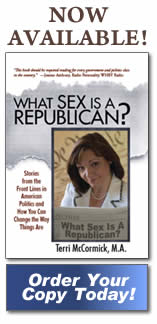 Some would call the notion of preprimary electioneering a stereotype of a political bygone era of cronyism and backroom deals reminiscent of the late 1800s and turn of the twentieth century.
Some would call the notion of preprimary electioneering a stereotype of a political bygone era of cronyism and backroom deals reminiscent of the late 1800s and turn of the twentieth century.
The image is clear—party bosses and career politicians, sitting in leather chairs in dark rooms, with the shades pulled down, smoking cigars, handpicking their candidate. Yet this scenario, one hundred years later, appears to be part of a cycle that repeats itself when “we the people” are not engaged in our own government.
As a candidate for the United States Congress in January 2006, I began the usual exploratory committee comprising community leaders, veterans, friends, business leaders and education leaders. As the founder of the charter school movement in Wisconsin twelve years earlier, I decided to make the historic announcement of my bid for Congress at a charter school. Once I had thrown my hat into the congressional race, I planned a trip to visit with party leaders in Washington DC, meeting with the National Republican Campaign Committee (NRCC) to seek their help and advice on the process. Yet when I arrived in Washington, things were already decided. In an unusual twist, I was given one story by the NRCC and another story by a Washington news correspondent.
I had arranged for a lunch meeting with Brian Tumulty a Washington news correspondent for Gannett, a leading news and information company that publishes, among many newspapers, USA TODAY. Our conversation spanned the topics of my views on public policy, past record and family life. He asked me what my schedule was in Washington. I mentioned that later in the day I would be meeting with the National Republican Campaign Committee to see what kind of assistance they offered candidates in Republican primaries. After our luncheon, Mr. Tumulty offered to give me a tour through the USA TODAY offices in Washington. Amid rows of awards, I found row after row after row of newspaper desks for Gannett newspapers across the country. It reminded me of the newspaper bullpen at the Wisconsin state capitol but much larger.
“Here are the offices of the Gannett newspapers for Duluth, Minnesota … Dubuque, Iowa … and on this side of the building are the USA TODAY offices,” he said, showing great care and consideration for the importance of his work. “This is where the guardians of democracy do their work,” he added.
A sigh and feeling of relief came over me as I spoke out loud, “Thank goodness we have the press.” Tumulty turned for an instant and looked surprised at the sincerity in my voice. The press was my backstop at the state capitol. I relied on the transparency that journalists provided to keep some of my political colleagues honest—or at least on notice. Those front-row game players who believed “politics is only a game” were trouble for any of us who were there to serve the public. As we finished the tour, my belief in our government had grown. Not only did this seem to be a good first meeting, but I had the sense that this man would treat me fairly throughout the campaign. I walked away feeling as though I could trust him.
 Next, I hurried to catch the subway to the capitol square stop, where I was about to meet with leaders from the National Republican Campaign Committee (NRCC). The Republican Headquarters was next to the Capitol Hill Club, adjacent to Congress. There, I would find staffers from the NRCC who were assigned to brief me and help me navigate through the press and process of running for the U.S. Congress.
Next, I hurried to catch the subway to the capitol square stop, where I was about to meet with leaders from the National Republican Campaign Committee (NRCC). The Republican Headquarters was next to the Capitol Hill Club, adjacent to Congress. There, I would find staffers from the NRCC who were assigned to brief me and help me navigate through the press and process of running for the U.S. Congress.
The meeting seemed brief. The staff we met with appeared to be in their twenties. Aside from the security check going up and down from the elevators, the only memorable comment I was given by one staffer was: “We treat all primary candidates equally. Whatever information we give to one candidate, we give to all primary candidates so that the races are fair and the people get to decide on the local level.”
The flight to Washington DC, running to catch subways and the variety of meetings had worn me out. I headed back to my hotel room to freshen up and take a nap before my husband and I planned to go out for dinner. It was at this time that my hotel phone rang with an unexpected caller.
“Hello,” I answered, still tired from the activities of the day.
“Terri, this is Brian Tumulty with Gannett newspapers. I have been doing some checking on the recently released financial reports from House Speaker Hastert, and he has given a maximum contribution to your Republican primary opponent.”
As I scrambled to grasp what that could have meant, I listened further to his questions.
“Terri, did you meet with the NRCC? And if you did, what did they say?”
“Yes, I met with the NRCC,” I responded, “and they assured me that this would be a fair race; that they would give all information and resources equally to all candidates in the republican primary.”
“So the NRCC did not tell you that they were doing a preprimary endorsement of your primary candidate?” Brian asked. “Do you have anything to comment?”
I was stunned. I was speechless. The NRCC had led me to believe just forty-five minutes earlier that this primary was an open primary for an open seat in the U.S. House of Representatives, and they would treat everyone fairly.
This was a reporter whom I had only met that day over lunch … yet I believed him.
Tumulty interrupted the silence. “Let me do some more research, and I will get back to you. Will you be at this phone number?” Betrayal and utter disappointment swept over me all at once. The whole idea of my own party leader’s deception was as though all of the air went out of me. Who would do such a thing? I thought.
When Brian Tumulty phoned back a short time later, he admitted that he had gotten Hastert’s staff on the phone, “What about this Rule No. 11? The RNC and the NRCC said that they have permission to do anything they can to get your opponent in, because of your party’s leadership in Wisconsin.”
“Rule No. 11?” I questioned back. “I have never heard of Rule No. 11.” How could a party rule take the right of an American citizen to run for office and to vote? I wondered. So there I was, facing an unprecedented situation, one that left me with a choice: back out of the race now, or go back against my words in my announcement for Congress. Once the initial shock wore off, I made a statement to the press. My words were from the heart, and they were quoted accurately by Gannett’s Washington news:
“Call me old-fashioned, but I believe the voters should decide who represents them in Washington. The preprimary pick of Hastert and the state party elites is nothing more than electioneering.”
Perhaps it was because I was considered a reformer, beginning with the charter school movement as a private citizen, and then with capital investment innovations as chair of Economic Development. The competitive bidding models I proposed put Wisconsin on the map for saving tens of millions of dollars for prescription drugs, not to mention the national models for support for manufacturers and the small-business regulation reform.
How could this be a merit-based decision? Whatever the reason, it was clear that the GOP elites from outside my congressional district were reaching into the Eighth Congressional District in Wisconsin to help throw the election….To continue reading this chapter, get your copy of “What Sex is a Republican in paperback or Kindle edition on Amazon.
About the Author:
Terri McCormick is an author, policy expert, educator, and former state representative to the Wisconsin State Legislature. Today, she offers her expertise in public and government relations through McCormick Dawson CPG Ltd., a trusted consultancy of independent contractors.
Ms. McCormick serves as president and CEO of the company, drawing from more than two decades of professional experience, a strong educational foundation, a host of industry-related publications, and a multitude of accolades, awards and formal recognitions. Holding a Master of Arts in administrative leadership from Marian University, and a Bachelor of Science in political science and public administration from the University of Wisconsin, Ms. McCormick received both degrees with high honors.
“What Sex is a Republican?” is sold on Amazon in both the paperback edition as well as Kindle edition. Read reviews on Amazon here.



